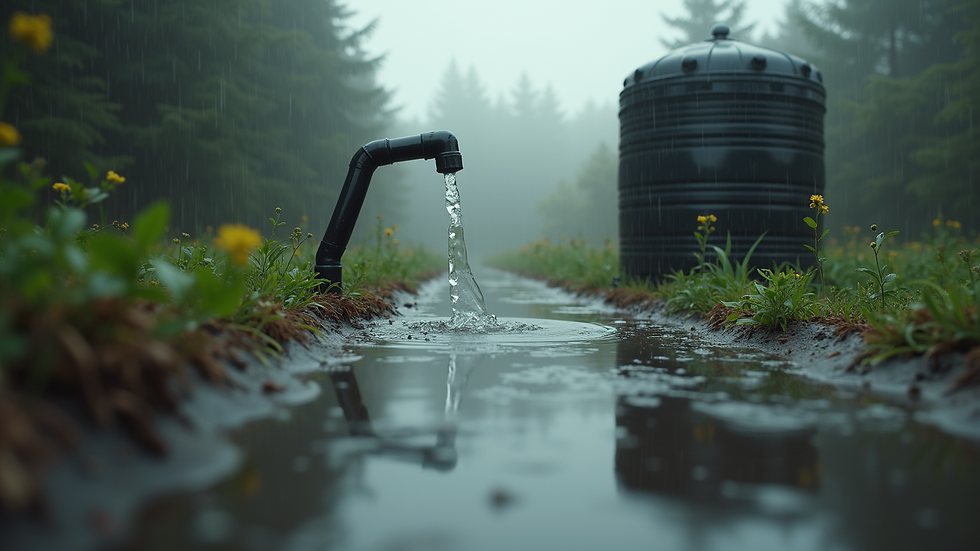Innovative Water Solutions for Off-Grid Living
- Brumby

- Jul 21, 2025
- 5 min read
In today's world, many people seek to embrace a lifestyle that reflects their values, sustainability, and self-sufficiency. Off-grid living, where homes operate independently of municipal systems, is increasingly popular. The most critical element in any sustainable living situation is water. This blog post explores innovative water solutions that can support off-grid living, helping to cultivate self-reliance and environmental stewardship.
Understanding Off-Grid Water Needs
Living off the grid involves some unique challenges, especially regarding water. Traditional water supply methods, such as public water systems, are not available. Therefore, it is crucial to explore alternative water solutions. Water is essential for drinking, cooking, bathing, and even gardening. Understanding how to source and manage this precious resource is vital for anyone considering off-grid living.
Many off-grid residents utilize various water sources, such as rainwater, wells, and natural springs. Knowing the best way to source, store, and purify water can make a significant difference in self-sufficiency and overall quality of life.

Water Collection Techniques for Off-Grid Water Living
One of the most popular methods for obtaining water in off-grid living is rainwater collection. Rainwater can be captured from rooftops and diverted into storage tanks. This method is not only efficient but also environmentally friendly. Here are some techniques to consider:
Gutter Systems: Properly installed gutters and downspouts help channel rainwater into barrels. Ensure that your roof is made from non-toxic materials.
Storage Tanks: Collecting rainwater is only half the solution. Use food-grade storage tanks made from UV-resistant materials to extend the life of your water supply.
Filter Systems: You must filter rainwater before consumption. Simple mesh filters can remove larger debris, while additional filtration systems can eliminate bacteria and other contaminants.
Maintenance: Regular cleaning of your rainwater collection system will ensure the water remains clean and usable.

What is the Best Water Source for Off-Grid Living?
Selecting the best water source can depend on your geographic location. Here are common water sources for off-grid living along with their pros and cons:
1. Rainwater Harvesting
Pros: Renewable, sustainable, and often free.
Cons: Dependent on local rain patterns; storage capacity may dictate the amount of water you can collect.
2. Drilled Wells
Pros: Generally reliable; provides a constant water source year-round.
Cons: High initial costs for drilling; requires maintenance and potential permits.
3. Surface Water
Pros: Easy to access; running streams or lakes can provide ample water.
Cons: Water must be purified; potential for contamination from wildlife.
4. Spring Water
Pros: Generally clean and natural; minimal filtering required.
Cons: Accessibility issues; potential property disputes over water rights.
Understanding these options helps you make the right decision and adopt the most appropriate systems for your situation.

Water Filtration and Purification Methods
Regardless of your water source, purification is crucial for off-grid living. Here are some practical methods to ensure your water remains safe for consumption:
Boiling: Boiling water for at least 1 minute is a sure way to kill pathogens, making it safe to drink.
Filtration Systems: There are several filtration systems available, including activated carbon filters, reverse osmosis systems, and UV light purifiers. Selecting a high-quality filtration system can ensure that you have clean, safe water.
Chemical Treatments: In emergency situations, chlorine or iodine tablets can effectively purify water. However, these methods should be used sparingly as they may leave residual taste.
Water Testing Kits: Regular testing is vital to ensure your water remains free from harmful bacteria and pollutants. Simple testing kits are available from educational resources or local hardware stores.
Sustainable Practices for Water Conservation
Living off the grid means practicing sustainability in all aspects, including water use. Here are actionable recommendations for conserving water:
Limit Outside Water Use: Utilize drought-resistant plants in gardens and landscaping. Collect gray water from sinks or showers to help water gardens.
Install Low-Flow Fixtures: Using low-flow faucets and showerheads can dramatically reduce water consumption.
Create a Water Budget: Track daily water usage to identify areas where you can cut back. Being aware of consumption helps manage resources better.
Educate Others: If you live in a community of off-grid dwellers, share water conservation tips and practices, fostering an environment of sustainability.
By implementing these sustainability practices, you can stretch your water supply further, ensuring long-term usability and minimal environmental impact.

Embracing Innovative Technologies for Off-Grid Water Solutions
Technology makes off-grid living more accessible and efficient. Innovative water solutions are emerging, and integrating these technologies can lead to better management of water resources. Here are some examples:
Solar-Powered Water Pumps: Utilizing solar energy, these pumps can draw water from wells or streams, providing a renewable way to access water without the need for mains electricity.
Hydroponic Systems: Modern hydroponics allows you to grow food with minimal water. These systems often use up to 90% less water compared to traditional agriculture.
Rain Garden Designs: Nature-inspired landscaping known as rain gardens can help manage runoff and promote natural groundwater recharge.
Advanced Filtration Technologies: Innovations in compact, portable filtration units now make it possible to purify water on-the-go, allowing for more adventurous off-grid living.
By collaborating with technology and traditional methods, off-grid dwellers can find innovative ways to ensure a steady, clean water supply.
Exploring Community Water Solutions
When living off-grid, community collaboration can play a vital role in securing water access. Here are some methods communities can explore together:
Anticipate Collective Needs: Communities can pool resources to create larger water systems like wells or communal rainwater setups.
Education Initiatives: Hosting workshops on water collection, purification, and conservation techniques can promote awareness and community engagement.
Resource Sharing: Neighbors can share resources like rainwater collection systems or filtration systems, reducing the financial burden on individuals.
Fundraising for Infrastructure: Communities can work together to raise funds for building infrastructure that benefits everyone and encourages sustainable practices.
By fostering a sense of community, off-grid living can be more manageable and effective, resulting in a more sustainable lifestyle.
In summary, innovative water solutions are crucial for successful off-grid living. By understanding options such as rainwater harvesting, well utilization, and natural springs, as well as incorporating sustainable practices and technologies, individuals and communities can ensure their water needs are met in an environmentally friendly manner. Explore potential strategies and remember that local resources and community collaboration can make your off-grid journey much easier and more rewarding. For further details on off-grid water solutions, you can visit Brumby Pumps.






Comments